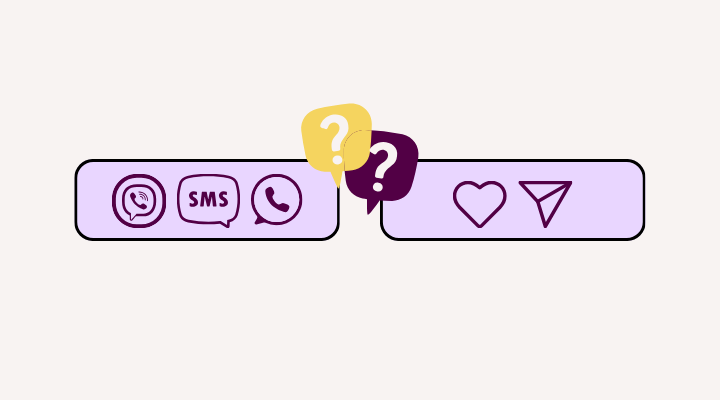Social media has become an integral part of our daily lives. With millions of active users worldwide, it’s considered one of the most competitive platforms for businesses in marketing and branding.
But how effective is it?
Behind the likes and shares, customers seek something more meaningful: personal connection and direct communication. They want messages that resonate with them, make them feel unique, and ultimately build trust with your brand.
In this article, we’ll explore the advantages and disadvantages of Mobile Marketing and Social Media to help you choose the right tool to achieve your business goals.
Let’s get started!
At a Glance:
- Mobile Marketing: Advantages & Disadvantages
- Social Media: Advantages & Disadvantages
- Mobile Marketing VS Social Media
- Which is Better for My Business?
Mobile Marketing: Direct and Personal Communication
Mobile Marketing offers a powerful mix of immediacy, personalization, and high effectiveness, making it an ideal tool for businesses seeking to maintain close and meaningful contact with their customers.
Advantages of Mobile Marketing
High Open Rates: SMS messages boast impressive open rates of over 98%. This means almost every message you send is read by its recipient. Unlike social media ads, which can often go unnoticed in the vast sea of posts, Mobile Marketing ensures your message reaches its destination.
Instant Delivery: Speed is crucial in the business world. SMS and messages via Viber or WhatsApp are delivered within seconds, making Mobile Marketing perfect for time-sensitive offers, such as flash sales or last-minute announcements. This immediacy ensures your message reaches your audience at the right moment, increasing the likelihood of a response.
Advanced Personalization: By leveraging customer data, you can tailor your messages to the needs, preferences, and behaviors of your audience. For example, you can send personalized birthday messages with special offers or notify a customer about the arrival of a product they’ve shown interest in. This personalized approach fosters care and attention, strengthening customer relationships.
Disadvantages of Mobile Marketing
Limited Space: SMS messages are limited to 160 characters, which can make it challenging to convey longer messages. While apps like Viber and WhatsApp allow for more features, such as images, links, and emojis, the formatting must remain simple and engaging. This requires careful content creation to ensure clarity, conciseness, and effectiveness.
Consent Requirement: Sending messages through Mobile Marketing requires explicit consent from recipients, in line with GDPR. While this protects customer privacy, it can limit your audience size. However, customers who have given their consent are typically more engaged and likely to respond to your campaigns.
Social Media: Dynamic and Wide-Reaching Communication
Social media platforms allow businesses to create content, interact with customers, and enhance brand visibility.
Advantages of Social Media
Wide Reach: Platforms like Facebook, Instagram, TikTok, and LinkedIn offer access to millions of users worldwide. Whether through organic content or paid ads, Social Media enables businesses to target diverse demographic and geographic audiences. For instance, a viral TikTok video can attract thousands of new followers within hours, while a carefully crafted Facebook ad can target specific users based on age, gender, or interests.
Variety of Content Formats: Social Media allows businesses to experiment with various content formats, such as videos, images, stories, reels, and live streaming. This flexibility enables communication to be tailored to audience preferences, making content more engaging. A creative video or striking image can capture user attention and drive higher levels of engagement.
Audience Interaction: The ability to interact is one of the key reasons Social Media has become so popular. Users can comment, like, share content, or even participate in contests and polls. This interaction not only strengthens the connection with the brand but also provides valuable insights into audience preferences and reactions.
Disadvantages of Social Media
Reduced Organic Reach: Over time, social media platforms have modified their algorithms to prioritize paid content, reducing the organic reach of posts. This means businesses need to invest more in ads to reach their audience. A post that once reached thousands of users may now be seen by only a small percentage of followers.
Content Saturation: Social media is flooded with an overwhelming amount of content daily, making it challenging for a brand to stand out amidst the "noise." Users are bombarded with messages, ads, and updates, making it increasingly difficult for businesses to capture their attention. Creating content that stands out requires creativity, strategy, and often, a higher budget.
Mobile Marketing VS Social Media
Investment Cost: Mobile marketing, such as SMS and Viber messages, is a cost-effective option with a low cost per message, making it ideal for small businesses. In contrast, social media ads often require a larger investment, especially if the goal is to reach wider audiences or create high-quality content.
Trust and Loyalty: Mobile marketing messages provide a more personal and direct connection, fostering customer trust. On the other hand, social media facilitates interaction and brand visibility but is often perceived as less reliable due to the overwhelming amount of content and advertisements users encounter.
Speed: Mobile marketing is incredibly fast, with messages reaching customers instantly and delivering quick results. In contrast, social media campaigns generally take longer to gain attention unless they involve paid advertising or achieve viral status.
Audience Targeting: Mobile marketing allows for targeting specific, consented audiences, which ensures higher engagement rates. While social media can reach much larger audiences, it often lacks precision, resulting in lower chances of user interaction.
Which is better for my business?
The choice between Mobile Marketing and Social Media depends on your business goals and needs.
- If your goal is immediate and targeted communication with your audience, Mobile Marketing through SMS, Viber, or WhatsApp is the ideal solution, ensuring high open rates and instant responses.
- If you aim to increase brand awareness and establish a strong online presence, social media offers a variety of tools for creating content, interacting with the audience, and enhancing your business image.
Mobile Marketing and Social Media should not be viewed as competing tools but as complementary ones. A comprehensive marketing strategy that combines both can yield the best results, enabling your business to reach its audience in different ways and drive success.


